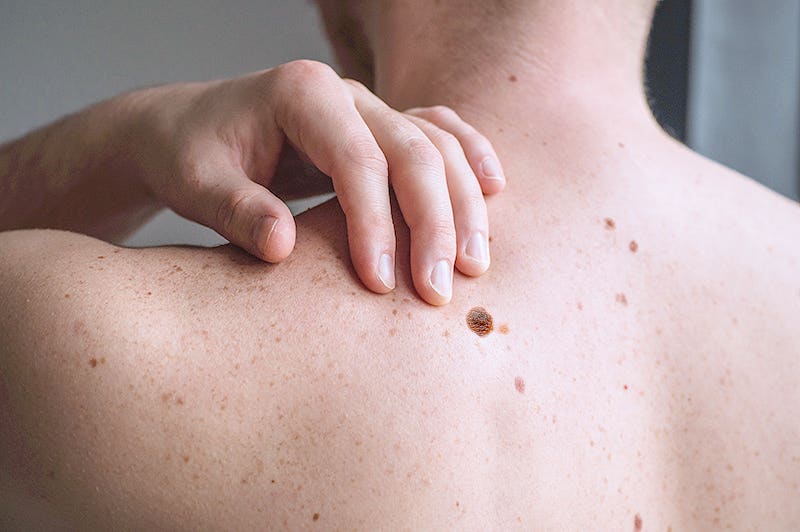Revolutionary skin cancer vaccine dramatically boosts survival rates in male patients
A second generation melanoma vaccine is demonstrating significant improvements in long-term survival rates for melanoma patients compared to

A second generation melanoma vaccine is demonstrating significant improvements in long-term survival rates for melanoma patients compared to its predecessor. (CREDIT: Creative Commons)
A groundbreaking melanoma vaccine, currently in its second generation of development at UVA Cancer Center, is demonstrating significant improvements in long-term survival rates for melanoma patients compared to its predecessor, according to recent research.
Moreover, this advancement seems to offer greater benefits to male patients than female patients, potentially reshaping the landscape of cancer vaccine development.
Led by Dr. Craig L. Slingluff Jr., the team of vaccine developers discovered that by concurrently activating crucial immune cells known as "helper T cells" to recognize melanoma proteins alongside stimulating killer T cells against melanoma, they could enhance the efficacy of their melanoma vaccine. This dual action not only improved patient survival rates but also acted as a barrier against cancer reoccurrence.
Craig L. Slingluff Jr., MD, and his team at UVA Cancer Center have developed a second-generation melanoma vaccine to treat the dangerous skin cancer. (CREDIT: Dan Addison | UVA Health)
While the reason behind the vaccine's heightened effectiveness in men remains unclear, the researchers emphasize the emerging significance of biological sex in melanoma patient outcomes, particularly in the realm of immune therapies. These findings underscore the importance of understanding how to maximize the benefits of effective immunotherapies for both men and women.
Dr. Slingluff, a surgical oncologist and translational immunologist at UVA Health and the University of Virginia School of Medicine, expressed optimism about the potential of this second-generation melanoma vaccine to extend the survival of patients post-surgery for high-risk melanoma.
He envisions its integration with other immune therapies to amplify patient benefits beyond what either treatment could achieve alone.
Traditionally, vaccines are associated with preventing viral illnesses.
Related Stories:
However, melanoma vaccines work differently, inducing immune responses against human melanoma cells. Dr. Slingluff and his colleagues have been striving to enhance the effectiveness of these vaccines for treating melanoma, a deadly form of skin cancer responsible for thousands of deaths annually.
The trial, which involved over 160 clinical volunteers, evaluated two distinct approaches to stimulating CD4+ helper T cells and CD8+ killer T cells in patients with high-risk melanoma. Participants were randomly assigned one of two vaccine preparations of purified peptides designed to activate their helper T cells.
After a fifteen-year follow-up period, the results were promising with both vaccine approaches, but notably better with the second-generation vaccine. The most significant benefits were observed among younger men with earlier-stage melanoma, a finding described by researchers as both "meaningful and durable" in their recent scientific publication.
2 × 2 design to perform comparisons of Arms A and B (12 class I peptides (12MP) plus tetanus helper peptide) to Arms C and D (12 class I peptides (12MP) plus 6 melanoma helper peptides (6MHP)), as well as comparisons of Arms A + C (no Cy) to Arms B + D (+Cy). Panel was created with BioRender.com. (CREDIT: Nature Communications)
Dr. Slingluff expressed excitement about these findings, highlighting the potential to further enhance patient survival by combining the second-generation vaccine with other immune therapies. The findings from this multicenter trial underscore the pivotal roles age and biological sex may play in determining outcomes of immune therapy, providing critical insights for clinicians and researchers in refining these treatments.
Recognizing the importance of understanding and addressing disparities in treatment outcomes, Dr. Slingluff emphasized the need to investigate the underlying reasons behind age and sex-based differences to ensure equitable benefits for all patients. He looks forward to building upon these promising findings to advance the field of cancer immunotherapy.
Overall survival and recurrence-free survival by vaccine regimen and AJCC v8 stage. (CREDIT: Nature Communications)
Dr. Slingluff's pioneering research aligns with UVA Cancer Center's ongoing commitment to developing innovative cancer treatments and expanding patients' treatment options. The center's dedication to excellence in patient care and research has earned it recognition as one of only 56 "comprehensive cancer centers" in the nation by the National Cancer Center.
Moreover, the forthcoming Paul and Diane Manning Institute of Biotechnology at Fontaine Research Park signifies UVA's commitment to advancing the field of immunotherapy. The institute is poised to accelerate the development of new treatments and revolutionize healthcare delivery, not only within the state but also on a broader scale.
For more science and technology stories check out our New Innovations section at The Brighter Side of News.
Note: Materials provided above by The Brighter Side of News. Content may be edited for style and length.
Like these kind of feel good stories? Get the Brighter Side of News' newsletter.



